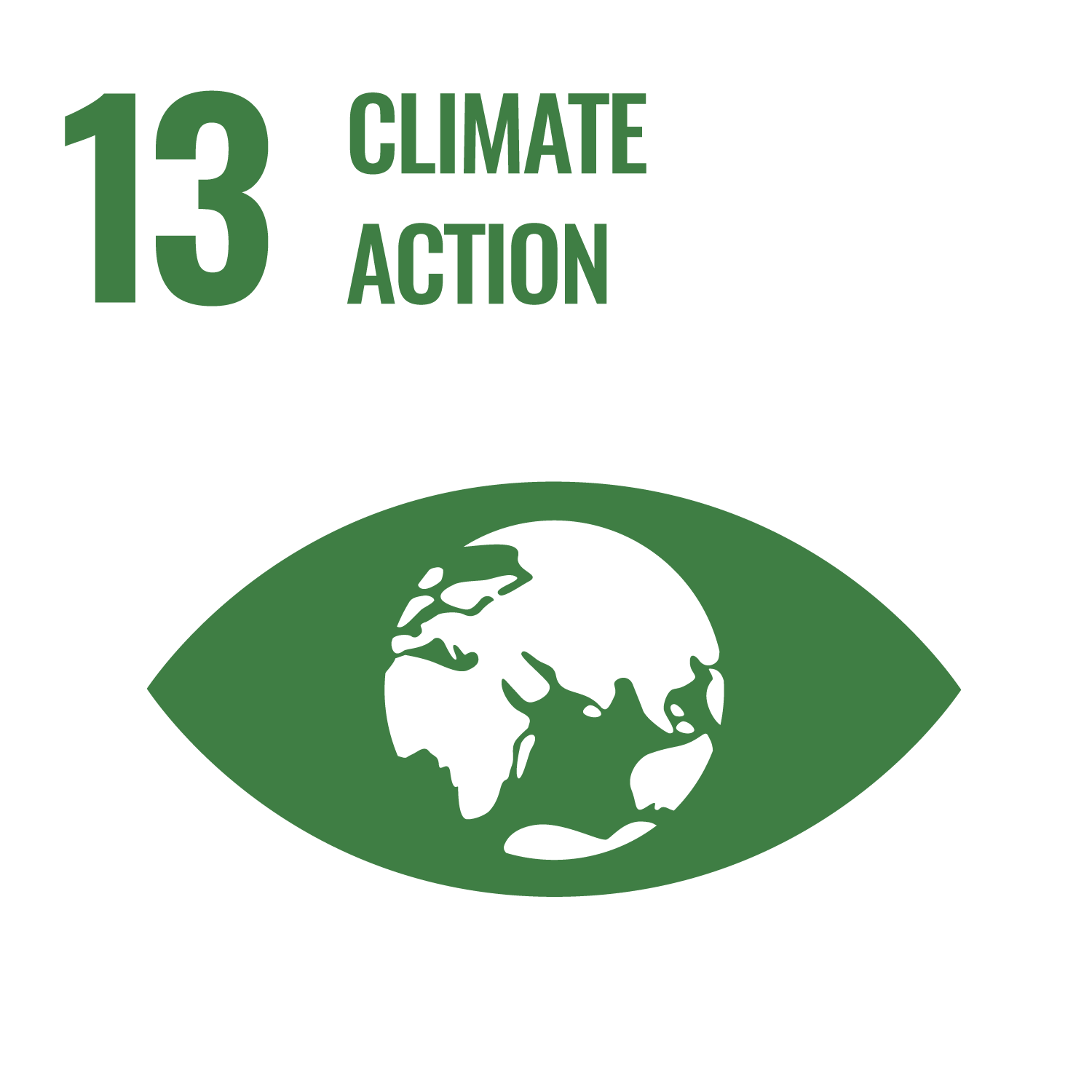 Goal 13. Climate Action
Goal 13. Climate Action
13.3.5 Environmental education collaborate with NGO
2023-2024
AASTMT plays a significant role in achieving this indicator through its active partnerships with local, regional, and international NGOs. AASTMT regularly engages in climate adaptation programs, environmental education campaigns, and joint research activities addressing issues such as sustainable resource management, marine ecosystem protection, and community resilience. By integrating NGO collaboration into its educational, research, and outreach strategies, AASTMT enhances its contribution to SDG 13 (Climate Action) fostering a culture of shared responsibility and practical learning.
AASTMT Participation in UniGreen conference "Shaping a Sustainable Future 2024:
On a national platform supported by the European Union, UniGreen is a youth-focused initiative spearheaded by the Life Makers Foundation and AASTMT that brings together universities, NGOs, private sector and government bodies to drive innovation in climate change mitigation and adaptation. The programme features a national competition, boot camp and workshops that challenge young teams to develop scalable solutions in areas such as greenhouse-gas emission reduction, waste management, desertification, renewable energy and the food-energy-water-ecosystem nexus. Through this initiative, AASTMT acts as co-organiser, knowledge-provider and educator, engaging youth, academia, and institutions in Egypt to build climate-aware leadership and practical adaptation solutions.
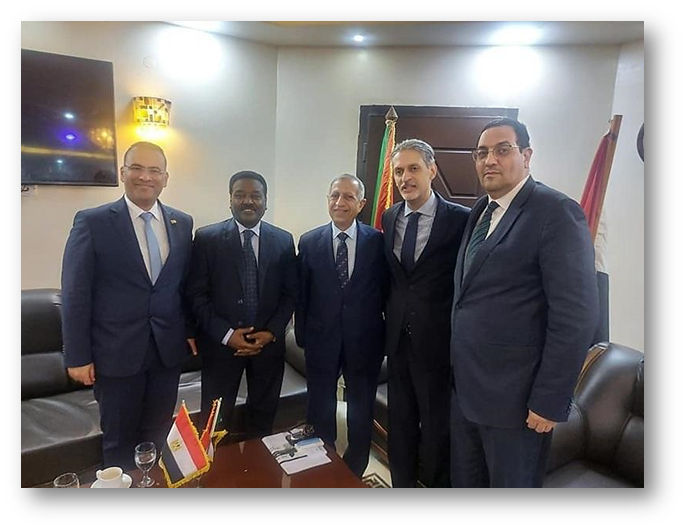
Collaborate of the AASTMT with the NGOs to tackle the SDGs:
AASTMT actively collaborates with NGOs and government entities to advance the SDGs, including SDG 13 (Climate Action). Through education, training, and community engagement, AASTMT supports social and environmental resilience, helping to build adaptive capacity in local communities. AASTMT organizes vocational and technical training programs in partnership with NGOs to empower youth, reduce poverty, and create sustainable livelihood opportunities. These programs contribute indirectly to climate adaptation and resilience, as they enhance communities’ ability to respond to environmental and economic challenges. Additionally, AASTMT students volunteer in educational outreach activities such as training school students for the Egyptian Olympiad in Informatics (EOI) under the supervision of the Ministry of Communications and Information Technology.
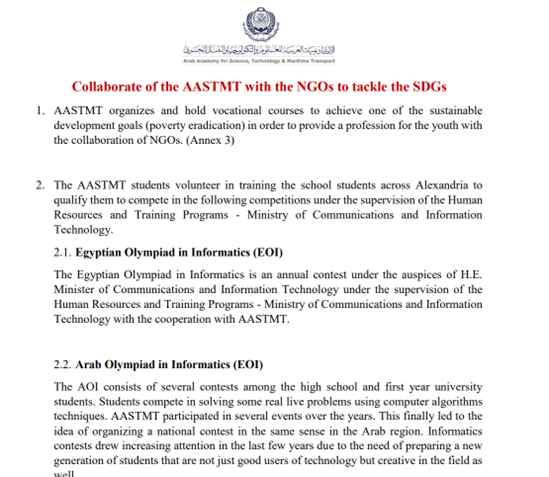
PRIMA Annual Work Plan (AWP) for the year 2024:
On February 14th, 2024, AASTMT organized an awareness Info-Day on the PRIMA Annual Work Plan 2024, highlighting opportunities for collaborative research in areas such as water management, sustainable farming systems, energy efficiency, and the Water-Energy-Food-Ecosystems (WEFE) Nexus. This event aligns closely with the objectives of SDG 13 (Climate Action) by promoting climate-resilient research, capacity building, and innovation for adaptation and mitigation. Through fostering partnerships among universities, government entities, NGOs, and the private sector, AASTMT contributes to strengthening institutional and scientific responses to climate-related challenges, supporting the transition toward sustainable and low-carbon development in the Mediterranean region.
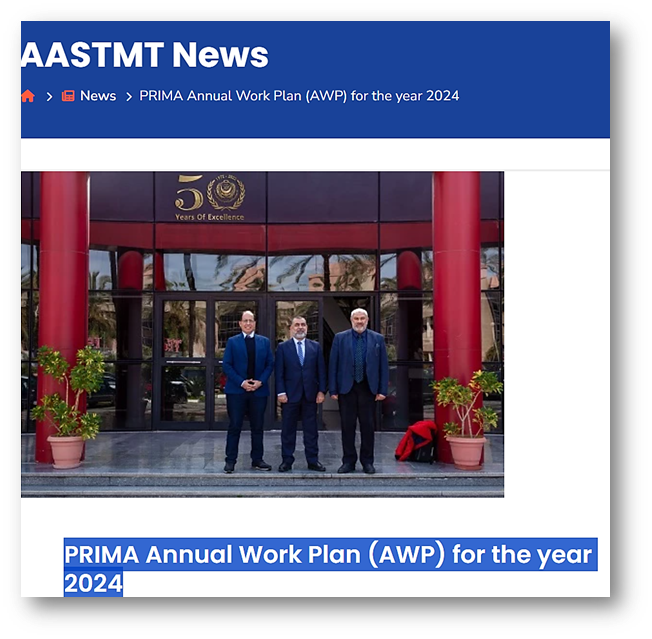
ASTMT President Participation in an international workshop on ‘The impacts of Climate Change on Coastal Cities:
On October 17, 2024, the Arab Academy for Science, Technology & Maritime Transport (AASTMT) participated in an international workshop titled “The Impacts of Climate Change on Coastal Cities”, held at the Bibliotheca Alexandrina. The event brought together experts, specialists, and representatives from multiple NGOs and research institutions to address the escalating climate risks faced by coastal urban centers such as Alexandria, which are increasingly threatened by sea-level rise, erosion, and extreme weather events. Through its active participation, AASTMT strengthened collaboration with regional NGOs, scientific experts, and policymakers, advancing joint educational and research efforts on climate-change adaptation for coastal communities. The event reflects AASTMT’s commitment to SDG 13 – Climate Action, particularly indicator 13.3.5, by fostering environmental education and NGO partnerships focused on building adaptive capacity and resilience in vulnerable coastal areas.
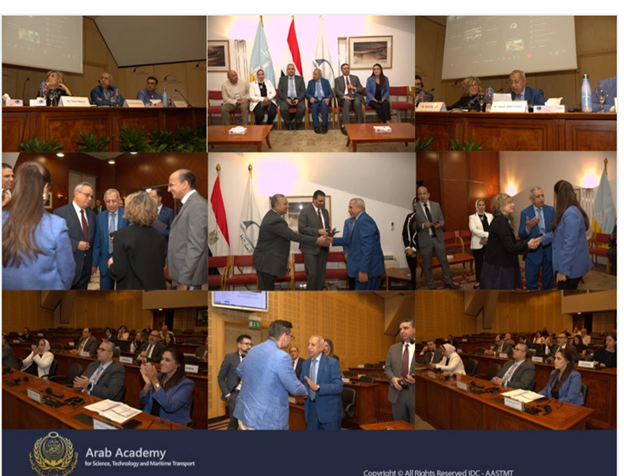
INVOLVE Project Integration of Sustainable Development Goals in Universities for Better Climate Change Management:
The INVOLVE Project aims to integrate sustainability and climate change management practices across universities in the Mediterranean region. AASTMT’s role includes ecosystem-based climate adaptation and biodiversity conservation strategies as part of land and resource management education. The INVOLVE Project aims to integrate sustainability and climate change management practices across universities in the Mediterranean region. AASTMT’s role includes ecosystem-based climate adaptation and biodiversity conservation strategies as part of land and resource management education. INVOLVE’s consortium includes NGO partners, this qualifies as formal collaboration on environmental education and adaptation.
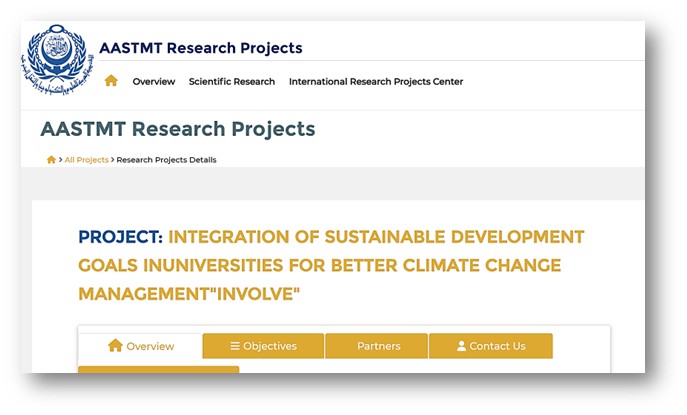
AASTMT INVOLVE Project
AAST Agreement with Obyan:
The AASTMT–Obyan MoU (August 2023) integrates environmental education, renewable-energy research, and sustainable innovation into academic programs through student–industry collaboration. While it strengthens AASTMT’s contribution to SDG 13 (Climate Action) and Egypt Vision 2030. The collaboration provides students with research, training, and project experience focused on renewable energy, green environment, and sustainability
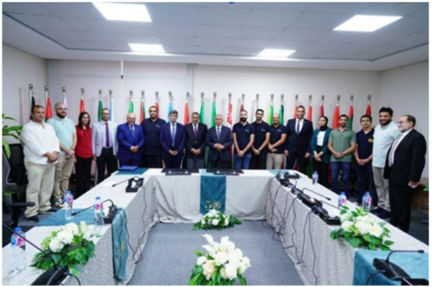
AAST Collaboration with EPROM:
The agreement explicitly aims to “support the educational learning process” and conduct awareness campaigns about sustainability and SDGs — clear educational actions. It targets projects and campaigns that “control the impact on climate change,” connecting to climate mitigation and adaptation awareness. it builds educational capacity, awareness, and partnerships for reducing climate impacts.
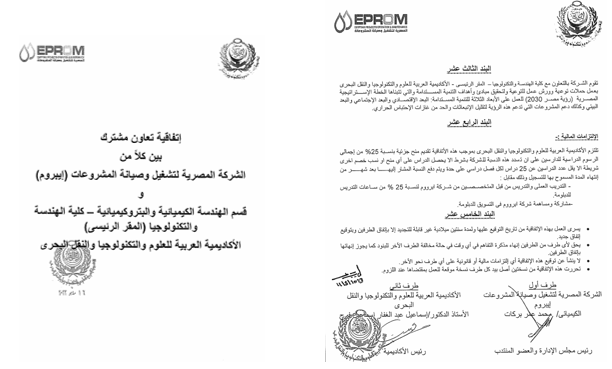
2022-2023
AASTMT actively collaborates with NGOs to promote environmental education and drive climate adaptation initiatives. Through partnerships with organizations such as the Life Makers Foundation, UNHCR, and RENEW-MENA, AASTMT delivers educational programs, workshops, and community-based projects focused on climate change, greenhouse gas reduction, and sustainable practices. These collaborations empower vulnerable populations, support emission reduction strategies, and enhance climate resilience in local and regional communities. By fostering these partnerships, AASTMT demonstrates a strong commitment to advancing global climate goals and promoting adaptive capacity in alignment with SDG 13. he project focuses explicitly on ecosystem-based climate adaptation, a direct component of climate-change resilience strategiTouMaLi Project and 2022 International Conference: Enhancing Marine Sustainability and Tourism
The TouMaLi Project ("Tourism Meets Marine Litter"), a collaboration involving AASTMT and led by the University of Rostock, demonstrates AASTMT's commitment to environmental education through partnerships with NGOs. This initiative addresses marine litter and promotes sustainable waste management within North Africa’s tourism sector, reducing emissions and conserving marine ecosystems. AASTMT’s hosting of the 2022 International Conference under this project brought together experts to discuss climate adaptation strategies and marine sustainability, reflecting its dedication to collaborative climate action and resilience-building efforts. This event highlights AASTMT’s role in fostering environmental education and advancing climate adaptation through NGO collaboration.
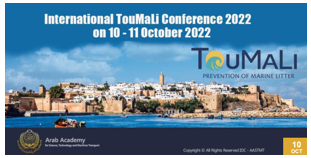
AASTMT Hosts International Conference on Sustainable Tourism and Marine Environmental Protection
AASTMT hosted the International Conference on Sustainable Tourism and Marine Environmental Protection, focusing on reducing marine waste and protecting coastal ecosystems through climate adaptation strategies. Collaborating with NGOs and experts, this initiative promotes sustainable tourism, highlights the importance of emission reduction, and reinforces climate resilience in marine environments.

Uni-Green Project: Empowering Youth for Climate Action
The Uni-Green Project, in collaboration with AASTMT, the Life Makers Foundation, and other stakeholders, empowers youth to take climate action by fostering education on sustainability and climate adaptation. Funded by the European Union, this initiative engages NGOs, universities, and community organizations to promote climate literacy and low-carbon practices, contributing to emission reduction and resilience-building.
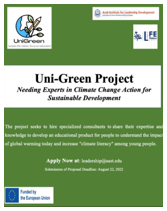
Learn more about this impactful collaboration here.
Go Green Workshop: A Collaborative Effort for Environmental Sustainability
The Go Green Workshop, organized by AASTMT in collaboration with the Egyptian Ministry of Environment, emphasized sustainable practices and climate adaptation. The workshop raised awareness about plastic use reduction and engaged NGOs and governmental stakeholders to promote environmental responsibility and resilience. This collaboration highlights AASTMT’s commitment to environmental education and partnerships with NGOs for climate adaptation initiatives.
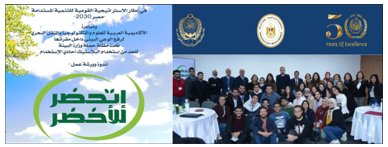
Discover more about this collaborative effort here.
Promoting Climate Awareness and Civil Society Collaboration for Sustainable Development
AASTMT’s collaboration with NGOs exemplifies its commitment to climate education and adaptation through community-driven initiatives. By fostering partnerships with civil society, AASTMT promotes climate awareness and sustainable practices, enhancing resilience in local communities. This initiative underscores the Academy’s role in supporting environmental education and collaborative climate action efforts.
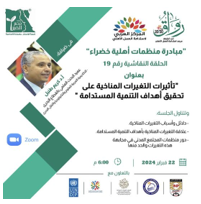
Explore more details about this collaboration here.
GasReg participates in RENEW – AAST Joint event on “Enhancing Education and Gender Inclusion for Energy Transition and Climate Action in MENA”
AASTMT, in collaboration with RENEW-MENA and GasReg, organized an event emphasizing education and gender inclusion in the energy transition and climate action in the MENA region. This initiative, supported by the World Bank, highlighted the role of NGOs in fostering climate education and adaptation. By focusing on inclusive energy policies and capacity-building, AASTMT demonstrated its commitment to working with NGOs to promote sustainability and climate resilience.
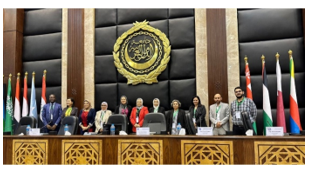
Discover more about this initiative here.
Leaders Hub Event to Promote Climate Awareness and Sustainable Practices
AASTMT’s Leaders Hub event, organized in collaboration with Empower Hub, focused on promoting climate awareness and sustainable practices through student-led initiatives. Participants created impactful content addressing climate change, plastic pollution, and sustainable agriculture, showcasing collaboration with civil society organizations to advance climate literacy. This partnership highlights AASTMT’s commitment to working with NGOs to foster environmental education and drive climate adaptation efforts.
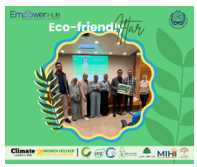
Learn more about this initiative here.
UNHCR Delegation at AASTMT: Empowering Refugees through Education
AASTMT, in collaboration with the UNHCR, launched the "Bridge of Hope" initiative, empowering refugees through education by providing scholarships for bachelor’s degrees. This collaboration aligns with AASTMT’s commitment to environmental education and climate adaptation, as refugees often face displacement due to climate-induced disasters. By equipping vulnerable populations with knowledge and skills, this partnership promotes sustainable livelihoods and enhances climate resilience, demonstrating AASTMT’s dedication to collaborating with NGOs on environmental and social challenges.
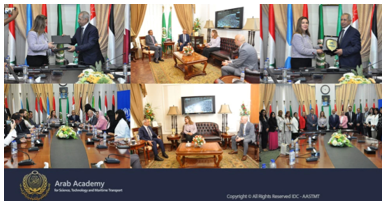
Discover more about this initiative here.
Bridge of Hope" Initiative: Empowering Refugees through Education in Collaboration with UNHCR
The "Bridge of Hope" initiative, a collaboration between AASTMT and UNHCR, focuses on empowering refugees through higher education scholarships. This initiative addresses climate adaptation challenges, as refugees often experience displacement due to climate change impacts. By equipping vulnerable populations with essential skills and education, the program fosters climate resilience and promotes sustainable livelihoods. This partnership highlights AASTMT's dedication to environmental education and collaboration with NGOs to support climate adaptation efforts.
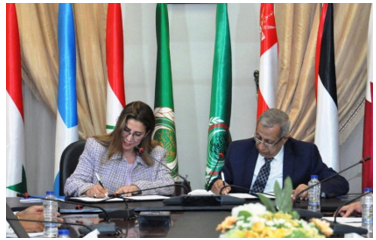
2021 - 2022
The Arab Academy for Science, Technology & Maritime Transport (AASTMT) has embraced its role in fostering environmental education and climate adaptation by actively collaborating with non-governmental organizations (NGOs) and other educational institutions. This approach is in line with Indicator 13.3.5 of the Sustainable Development Goals, which emphasizes the importance of cooperative efforts in addressing climate change challenges. AASTMT’s initiatives in this area are geared towards broadening the scope and impact of environmental education, promoting sustainable practices, and facilitating climate adaptation strategies.
The following are key implementations by AASTMT that highlight our collaborative efforts with various NGOs and educational entities on both local and regional levels:
Initiative towards a Green and Sustainable Future (13 September 2022):
AASTMT’s College of Engineering and Technology hosted an initiative to foster cooperation between the academy and schools for sustainable development education. This initiative included visits to the academy's solar power plant renewable energy lab, and the Aquaculture Center, involving students from various schools in Alexandria.
Green-Sustainable-Future-Initiative-Link on the AASTMT news page
World Environment Day 2022 (18 July 2022):
Organized by AASTMT, this event was part of our commitment to sustainable development and environmental protection.
World-Environment-Day-2022 on the AASTMT news page
IEEE YESIST12 Prelim 2022 (4 July 2022):
Hosted by AASTMT’s College of Engineering and Technology, this competition attracted participants from all over Egypt to compete in tracks serving different SDGs, including the WEPOWER track focused on SDG 7.
IEEE-YESIST12-Prelim-2022 on the AASTMT news page
Radio Interview on Smart Grid Technology Master Program (4 March 2022):
Professors Mostafa Abdel Geleil and Mostafa Saad discussed the Smart Grid Technology Master Program, emphasizing its relevance to sustainable energy and climate change solutions.
Climate Protectors Initiative (27 Feb 2022):
This initiative aimed at raising youth awareness about climate change and its impact on various SDGs and fostering skills for reducing carbon footprint.
Climate-Protectors-Initiative on theAASTMT web page
“Prepare for Green” Symposium and “Go Green” Workshop (10 Jan 2022):
These events, organized by AASTMT’s smart village branch, were part of the national “EGYPT 2030” sustainable development strategy, focusing on raising environmental awareness.
Prepare-Go-Green-Events on the AASTMT news page
Egyptian Photovoltaic Energy Market Seminar (26 Oct. 2021):
This seminar, led by Professor Ahmed Kadry Abdelsalam, focused on solar energy trends and advancements.
BE POSITIVE Campaign (15 July 2021):
Organized by AASTMT's ENERGY UNIT, this campaign focused on raising awareness about the importance of reducing energy usage.
Uni-Green Project:
AASTMT has been a nonprofit and non-governmental entity under the Arab League, contributing significantly to the education and training in the Arab and African regions. The Uni-Green project is part of this continuous effort, aligning with the national strategy for sustainable development "Egypt 2030".
Uni-Green-Project on the AASTMT news page
Meet Egypt's Mentees for Innovative Business Ideas, Entrepreneurship Center Spin-Offs:
AASTMT’s Entrepreneurship Center played a key role in INTECMED's mentorship program, supporting innovative business ideas that align with sustainable development goals.
Meet Egypt's Mentees For Innovative Business Ideas, Entrepreneurship Center Spin-Offs on the AASTMT web page
PROJECT: Monitoring, Assessment, and Innovative Treatment Technology to Enhance Groundwater Quality:
This project aims at improving groundwater quality for irrigation and adapting to climate change, especially in arid districts where groundwater is a crucial resource.
Groundwater-Quality-Project-Link on the AASTMT news page
Project: Climate Change Management Through Mitigation and Adaptation (Adaptm):
Supported by the Erasmus+ Programme, this project aims to modernize and develop master’s degrees in environmental science in Egypt, aligning with European educational standards.
AdapTM-Project-Link on the AASTMT news page
Project: Integration Of Sustainable Development Goals In Universities (Involve):
Aiming to strengthen the role of Egyptian universities in achieving environmental SDGs.
INVOLVE-Project on the AASTMT news page
Minister of Environment’s Support for Reducing Plastic Bags:
In collaboration with AASTMT, efforts were made to reduce the use of plastic bags, contributing to pollution reduction and sustainable development.
Plastic-Bags-Reduction-Initiative on the AASTMT news page
AASTMT's active participation in these diverse initiatives demonstrates our deep commitment to environmental education and collaboration with NGOs and government bodies in climate adaptation strategies. These efforts highlight our role in contributing to a sustainable future and combating climate change on both a local and regional scale.
Through these diverse initiatives, AASTMT demonstrates a robust commitment to environmental education and climate adaptation in collaboration with various NGOs and educational institutions. These efforts reflect our dedication to fostering a sustainable future and contributing actively to global climate action.



